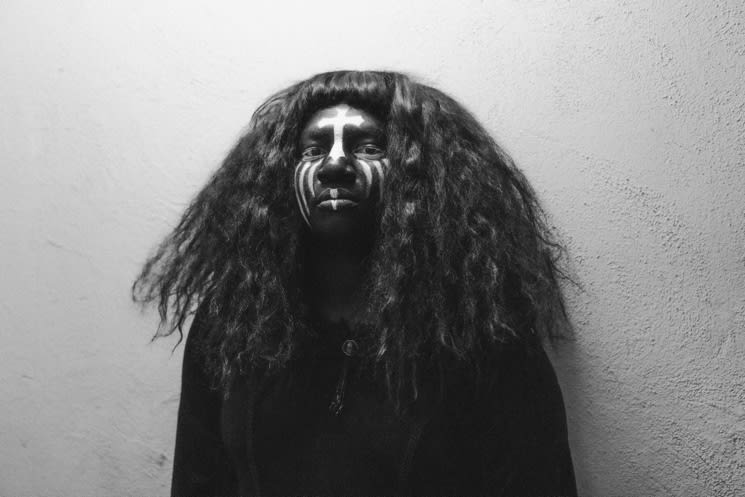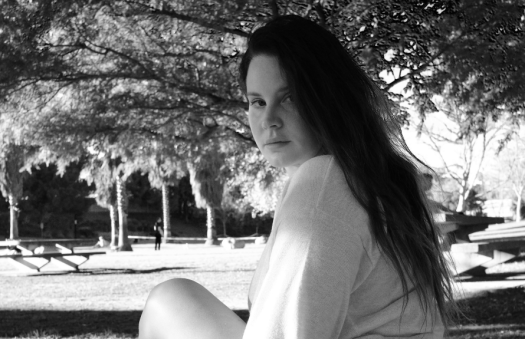Let the credits roll — Backxwash has wrapped her horrorcore trilogy. HIS HAPPINESS SHALL COME FIRST EVEN THOUGH WE ARE SUFFERING, released on Halloween, is her third album in as many years, and it brings more gothic melodies, cathartic screams, and disturbing samples from preachers.
"I like to treat albums like movies, and the flow of [the trilogy] is kind of like that, kind of cinematic," the Montreal artist known as Ashanti Mutinta tells Exclaim! "God Has Nothing to Do with This Leave Him Out of It was very brooding and dark and gothic, and I LIE HERE BURIED WITH MY RINGS AND MY DRESSES was just, like, my anger from A to Z."
She adds with a dry laugh, "Then this one is a bit dark and sad. Everything just fell into place."
It delivers everything Backxwash fans have come to expect from the artist, from high energy and heavy subject matter to surprising pops of inspiration from metal, hip-hop and screamo. These influences come through in the inclusion of guests like Toronto composer Morgan-Paige, UK extreme metal band Pupil Slicer and L.A. rapper Sadistik.
All three albums in the trilogy revolve around Mutinta processing her trauma as she moved away from churchgoing and toward the practices of her tribes in Zambia.
HIS HAPPINESS covers similar themes to acclaimed past albums God Has Nothing and I LIE HERE — the former of which landed Backxwash on the Exclaim! cover in 2020 and earned her the Polaris Music Prize later that year — such as faith, condemnation, darkness and rage. But it also tells a story from a different point in her life, capturing her more solemn preteen years.
Inspired to process and heal, Mutinta recalled what it was like to be that age, "trying to make sense of everything but not having the tools to be able to grasp what was happening."
She says, "Growing up and getting a better understanding of my emotions at the time was interesting … It was therapeutic, in a sense, processing those things — even being reminded those things happened to you when you're writing a verse and you're like, 'Oh, shit. This thing actually happened,' and it inspires you to put the music in a certain direction. It's just putting everything you feel on the tracks."
Despite its emotional heaviness, the album ends on a surprisingly uplifting note with "MUKAZI" — a thank-you to Mutinta's supporters set to a laid-back sample.
"If you're looking at it from a movie perspective, when the big baddie is defeated … the last scene kind of paints a picture that this thing is never coming back," she explains.
"I guess ['MUKAZI'] is looking forward to better days, but it's also an homage to the kind of music I used to make when I was younger," like conscious hip-hop with bright instruments and pop samples, she says.
Sonically, the instrumentation is complicated and layered, full of hand-picked "textures," acoustic and electronic elements, and high-energy vocals.
"If the beat is becoming denser, the voice has to match up," she says. "I don't want to let the beat overpower me. Sometimes, you have a lot of energy and want to release it, and the best thing you can do at that point is just scream."
She feels like she finally found her sound with this trilogy, and she's looking forward to writing new music now that she's hit her stride. There's more content to come, and whatever's next will be notably different from anything she's put out before.
"I know I can't talk about my trauma for another project. I have to find something else to talk about, and we'll have to innovate on the sound because of that," Mutinta says. "But I'm really happy with where the project is right now, and I can't wait to see what we do in the future."
"I like to treat albums like movies, and the flow of [the trilogy] is kind of like that, kind of cinematic," the Montreal artist known as Ashanti Mutinta tells Exclaim! "God Has Nothing to Do with This Leave Him Out of It was very brooding and dark and gothic, and I LIE HERE BURIED WITH MY RINGS AND MY DRESSES was just, like, my anger from A to Z."
She adds with a dry laugh, "Then this one is a bit dark and sad. Everything just fell into place."
It delivers everything Backxwash fans have come to expect from the artist, from high energy and heavy subject matter to surprising pops of inspiration from metal, hip-hop and screamo. These influences come through in the inclusion of guests like Toronto composer Morgan-Paige, UK extreme metal band Pupil Slicer and L.A. rapper Sadistik.
All three albums in the trilogy revolve around Mutinta processing her trauma as she moved away from churchgoing and toward the practices of her tribes in Zambia.
HIS HAPPINESS covers similar themes to acclaimed past albums God Has Nothing and I LIE HERE — the former of which landed Backxwash on the Exclaim! cover in 2020 and earned her the Polaris Music Prize later that year — such as faith, condemnation, darkness and rage. But it also tells a story from a different point in her life, capturing her more solemn preteen years.
Inspired to process and heal, Mutinta recalled what it was like to be that age, "trying to make sense of everything but not having the tools to be able to grasp what was happening."
She says, "Growing up and getting a better understanding of my emotions at the time was interesting … It was therapeutic, in a sense, processing those things — even being reminded those things happened to you when you're writing a verse and you're like, 'Oh, shit. This thing actually happened,' and it inspires you to put the music in a certain direction. It's just putting everything you feel on the tracks."
Despite its emotional heaviness, the album ends on a surprisingly uplifting note with "MUKAZI" — a thank-you to Mutinta's supporters set to a laid-back sample.
"If you're looking at it from a movie perspective, when the big baddie is defeated … the last scene kind of paints a picture that this thing is never coming back," she explains.
"I guess ['MUKAZI'] is looking forward to better days, but it's also an homage to the kind of music I used to make when I was younger," like conscious hip-hop with bright instruments and pop samples, she says.
Sonically, the instrumentation is complicated and layered, full of hand-picked "textures," acoustic and electronic elements, and high-energy vocals.
"If the beat is becoming denser, the voice has to match up," she says. "I don't want to let the beat overpower me. Sometimes, you have a lot of energy and want to release it, and the best thing you can do at that point is just scream."
She feels like she finally found her sound with this trilogy, and she's looking forward to writing new music now that she's hit her stride. There's more content to come, and whatever's next will be notably different from anything she's put out before.
"I know I can't talk about my trauma for another project. I have to find something else to talk about, and we'll have to innovate on the sound because of that," Mutinta says. "But I'm really happy with where the project is right now, and I can't wait to see what we do in the future."




